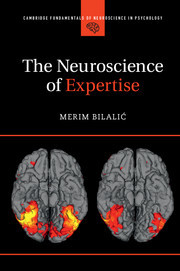Description
The Neuroscience of Expertise
Cambridge Fundamentals of Neuroscience in Psychology Series
Author: Bilalić Merim
The book examines the ways in which the brain accommodates the incredible feats of experts.
Language: English
Subject for The Neuroscience of Expertise:
The Neuroscience of Expertise
Publication date: 02-2017
316 p. · 15.4x22.8 cm · Paperback
Publication date: 02-2017
316 p. · 15.4x22.8 cm · Paperback
Approximative price 133.90 €
In Print (Delivery period: 14 days).
Add to cart
The Neuroscience of Expertise
Publication date: 02-2017
316 p. · 15.6x23.5 cm · Hardback
Publication date: 02-2017
316 p. · 15.6x23.5 cm · Hardback
Description
/li>Contents
/li>Biography
/li>
The Neuroscience of Expertise examines the ways in which the brain accommodates the incredible feats of experts. It builds on a tradition of cognitive research to explain how the processes of perception, attention, and memory come together to enable experts' outstanding performance. The text explains how the brain adapts to enable the complex cognitive machinery behind expertise, and provides a unifying framework to illuminate the seemingly unconnected performance of experts in different domains. Whether it is a radiologist who must spot a pathology in a split second, a chess grandmaster who finds the right path in a jungle of possible continuations, or a tennis professional who reacts impossibly quickly to return a serve, The Neuroscience of Expertise offers insight into the universal cognitive and neural mechanisms behind these achievements.
1. Introduction to research on expertise; 1.1 Introduction; 1.2 Definition of expertise and its domains; 1.3 Cognitive mechanisms in expertise; 1.4 How the brain accommodates expertise; 1.5 Expertise as a research vehicle in cognitive neuroscience; 1.6 Conclusion; 2. Perceptual expertise; 2.1 Introduction; 2.2 Anatomy of the perceptual system; 2.3 Adaptability of the perceptual system; 2.4 Visual expertise; 2.5 Auditory expertise; 2.6 Tactile expertise; 2.7 Gustative expertise; 2.8 Olfactory expertise; 2.9 Conclusion; 3. Cognitive expertise; 3.1 Introduction; 3.2 Memory systems and their neural basis; 3.3 Memory expertise (superior memory); 3.4 Calculation expertise; 3.5 Expertise in board games; 3.6 Spatial expertise; 3.7 Conclusion; 4. Motor expertise; 4.1 Introduction; 4.2 Anatomy of the motor system; 4.3 Adaptability of the motor system; 4.4 Simple motor tasks (skill acquisition); 4.5 Motor expertise; 4.6 Music (motor) expertise; 4.7 Cognitive component in motor expertise; 4.8 Neural implementation of motor expertise; 4.9 Conclusions; 5. The road to expertise; 5.1 Introduction; 5.2 Different experts, same cognitive and neural mechanisms; 5.3 Different approaches in expertise research; 5.4. The road to expertise; 5.5 Nature vs nurture in neuroscience; 5.6 Deliberate practice; 5.7 Conclusion.
Merim Bilalić is Professor of Cognitive Psychology at Northumbria University, Newcastle. He received his DPhil in Experimental Psychology from the University of Oxford, and has subsequently held research and teaching positions at Humboldt Universität zu Berlin, Brunel University, Eberhard- Karls-Universität Tübingen, Germany and Universität Klagenfurt, Austria. His research on problem-solving biases in experts won the Award for the Outstanding Doctoral Research Contribution to Psychology from the British Psychological Society in 2008.
© 2024 LAVOISIER S.A.S.
These books may interest you

The Psychology of Chess 142.04 €



